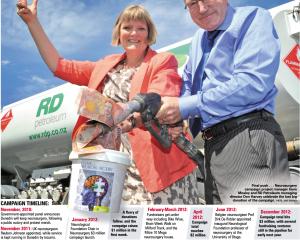The Omarama man knows.
He had life-saving surgery there in 2002, lost his wife Cate to an aneurysm, and his cousin was operated on in Dunedin about 25 years ago and is still living a perfectly healthy life.
"People think it is uncommon, but it can happen at any time to any family - look at my family.
I want to make people aware they need to support retaining the service in Dunedin," he told the Otago Daily Times yesterday.
In February 2002, Mr Gloag started to suffer severe, debilitating headaches.
He took Aspirin.
He contacted his doctor at Kurow who advised Paracetamol, but the headaches persisted.
Another visit to the doctor and he was on heavy pain medication but with the message: "If that doesn't work, come straight back."
It helped, but the headaches did not go away.
Mr Gloag was referred to Dunedin for a CT scan.
That identified a spontaneous subdural haematoma, brought on by stress.
Within days, Mr Gloag was operated on at the unit.
Three days later he was home, but his movements were restricted for six months.
"For me, neurosurgical services at Dunedin were both imperative and life-saving."
The proposal to close Dunedin's neurosurgery unit and provide the service from Christchurch alarms Mr Gloag.
He feels so strongly he has written to Minister of Health Tony Ryall outlining why Dunedin's neurosurgery unit should stay - and is encouraging other people to do so.
"I believe this significantly lessens the safety of people in southern New Zealand and must not be allowed to happen," Mr Gloag said.
Even in a remote area like Omarama, he can see the benefits of having neurosurgery in Dunedin - for patients, their families and because of the city itself.
Omarama to Dunedin is about two and a-half hours, Christchurch is about four hours.
Just getting to Christchurch poses problems for patients and families who want to visit, or go for post-operative checks, he says.
After Mr Gloag's operation he was not allowed to fly or drive for six months.
For post-operative visits, family members had to drive him.
He did get an exemption to drive for 10 minutes from his homestay at Buscot Station to Omarama - "but imagine trying to drive to Christchurch and having to stop every 10 minutes to get out and walk around".
"It is grossly unfair to New Zealanders living in remote areas if neurosurgery stops.
They contribute substantially to the country's economy and will face higher risks, extra stress and additional costs," he said.


